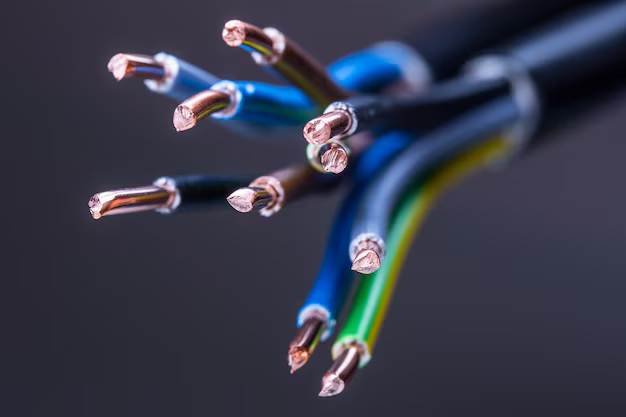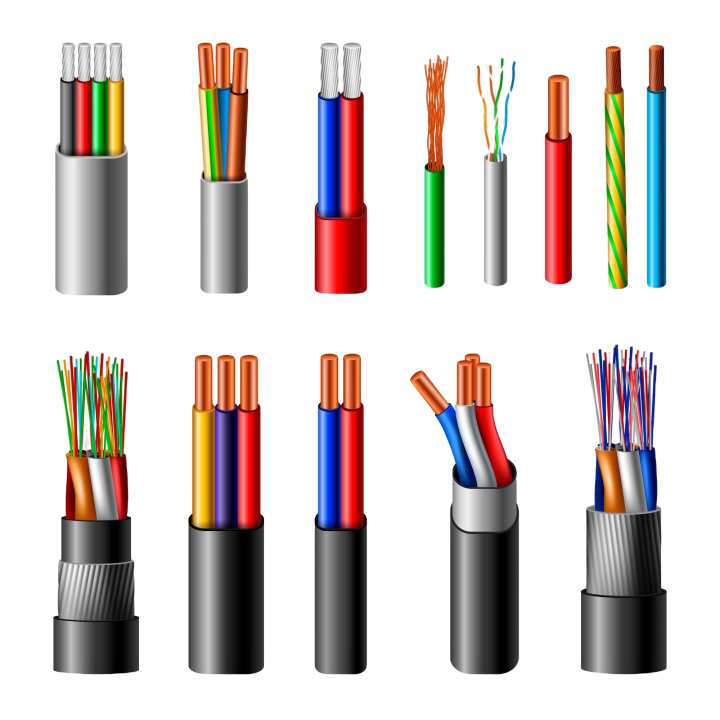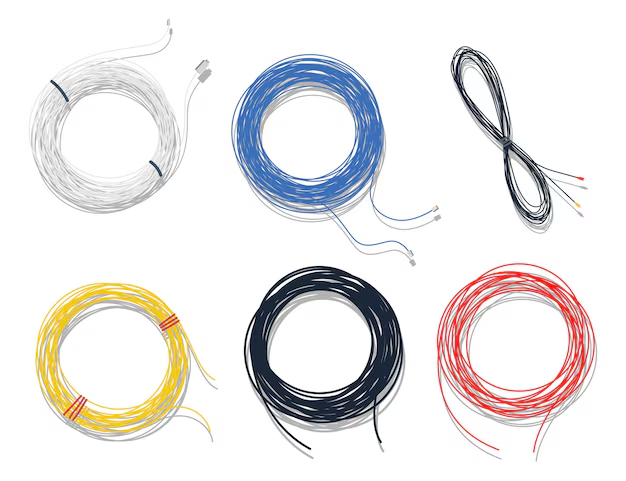Cables are an essential component of modern infrastructure, playing a crucial role in transmitting power, data, and signals across various industries. Whether you’re setting up a residential electrical system, networking infrastructure, or industrial machinery, choosing the right cable type is essential for performance, safety, and durability. In this comprehensive guide, we will explore the different types of cables, their applications, and the factors to consider when selecting the best option for your needs.
1. Electrical Cables
Electrical cables are used to transmit electrical power from one point to another. They consist of conductors, insulators, and protective sheathing.
Common Types of Electrical Cables:
- Low Voltage Cables: Used in residential and commercial electrical systems, these cables handle voltages up to 1 kV. Common applications include lighting, appliances, and general power supply.
- Medium Voltage Cables: Designed for voltages between 1 kV and 35 kV, these cables are typically used in industrial applications and for transmitting electricity from substations to local distribution points.
- High Voltage Cables: These cables handle voltages above 35 kV and are used in power transmission over long distances. They are essential for connecting power plants to electrical grids.
Key Considerations:
- Voltage rating
- Current carrying capacity
- Insulation material
- Environmental conditions
2. Coaxial Cables
Coaxial cables are widely used in telecommunications and data transmission. They consist of a central conductor, an insulating layer, a metallic shield, and an outer sheath.
Applications:
- Television and cable networks
- Internet and broadband services
- Radio transmission
Advantages:
- High bandwidth
- Resistance to electromagnetic interference (EMI)
- Reliable signal quality
3. Fiber Optic Cables
Fiber optic cables are the backbone of modern communication systems. They transmit data as light signals through glass or plastic fibers, offering unmatched speed and bandwidth.
Applications:
- High-speed internet
- Telecommunication networks
- Medical imaging
- Industrial automation
Benefits:
- High-speed data transfer
- Immune to EMI
- Long-distance signal transmission
Considerations:
- Cost
- Installation complexity
- Compatibility with existing infrastructure
4. Ethernet Cables
Ethernet cables are a vital part of networking systems, enabling wired connections between devices such as computers, routers, and switches.
Types of Ethernet Cables:
- Cat5 and Cat5e: Support speeds up to 1 Gbps.
- Cat6 and Cat6a: Support higher speeds, up to 10 Gbps, with better performance over long distances.
- Cat7 and Cat8: Designed for ultra-high-speed networks, supporting speeds up to 40 Gbps and beyond.
Applications:
- Home and office networks
- Data centers
- Gaming setups
Key Factors:
- Speed requirements
- Cable length
- Shielding needs
5. USB Cables
USB cables are ubiquitous in consumer electronics, facilitating data transfer and charging between devices.
Types of USB Cables:
- USB 2.0: Supports speeds up to 480 Mbps.
- USB 3.0 and 3.1: Offer speeds up to 5 Gbps and 10 Gbps, respectively.
- USB-C: A reversible connector with high-speed data transfer and power delivery capabilities.
Applications:
- Connecting peripherals (printers, keyboards, mice)
- Charging smartphones and tablets
- Data transfer between devices
Considerations:
- Compatibility with devices
- Data transfer speed
- Power delivery capabilities
See Also Top Cables Manufacturers in India: A Comprehensive Guide
6. Audio and Video Cables
Audio and video cables are essential for transmitting sound and visual signals in consumer electronics and professional AV setups.
Common Types:
- HDMI: High-definition multimedia interface for digital video and audio.
- VGA: Analog video transmission.
- RCA: Analog audio and video connections.
- Optical Cables: Digital audio transmission using light.
Applications:
- Home theater systems
- Professional AV setups
- Gaming consoles
Factors to Consider:
- Compatibility with devices
- Signal quality
- Length and flexibility
7. Control Cables
Control cables are used in industrial applications to transmit signals that control machinery and processes. They are designed to handle mechanical stress and harsh environmental conditions.
Applications:
- Robotics
- Conveyor systems
- Automation equipment
Features:
- Flexibility
- Resistance to oil, chemicals, and abrasion
- Shielding against EMI
8. Instrumentation Cables
Instrumentation cables are designed for transmitting low-energy electrical signals in monitoring and control systems.
Applications:
- Power plants
- Petrochemical industries
- Manufacturing processes
Characteristics:
- High signal accuracy
- Resistance to noise and interference
- Durable insulation
9. Specialty Cables
Specialty cables are tailored for unique applications, offering specific properties to meet demanding requirements.
Examples:
- Submarine Cables: For underwater power and data transmission.
- Fire-Resistant Cables: Maintain functionality during fires.
- Mining Cables: Designed for use in mining operations.
Conclusion
Choosing the right cable for your needs involves understanding the specific requirements of your application, such as voltage, bandwidth, environmental conditions, and durability. By selecting the appropriate cable type, you can ensure optimal performance, safety, and longevity of your systems.
If you’re looking for reliable suppliers, check out Enggpro for a comprehensive list of Cables Manufacturers in India. Enggpro connects you with trusted manufacturers and suppliers, making it easier to find the perfect cables for your projects. Whether you need electrical cables, fiber optics, or specialty cables, Enggpro is your one-stop solution for quality and reliability.



